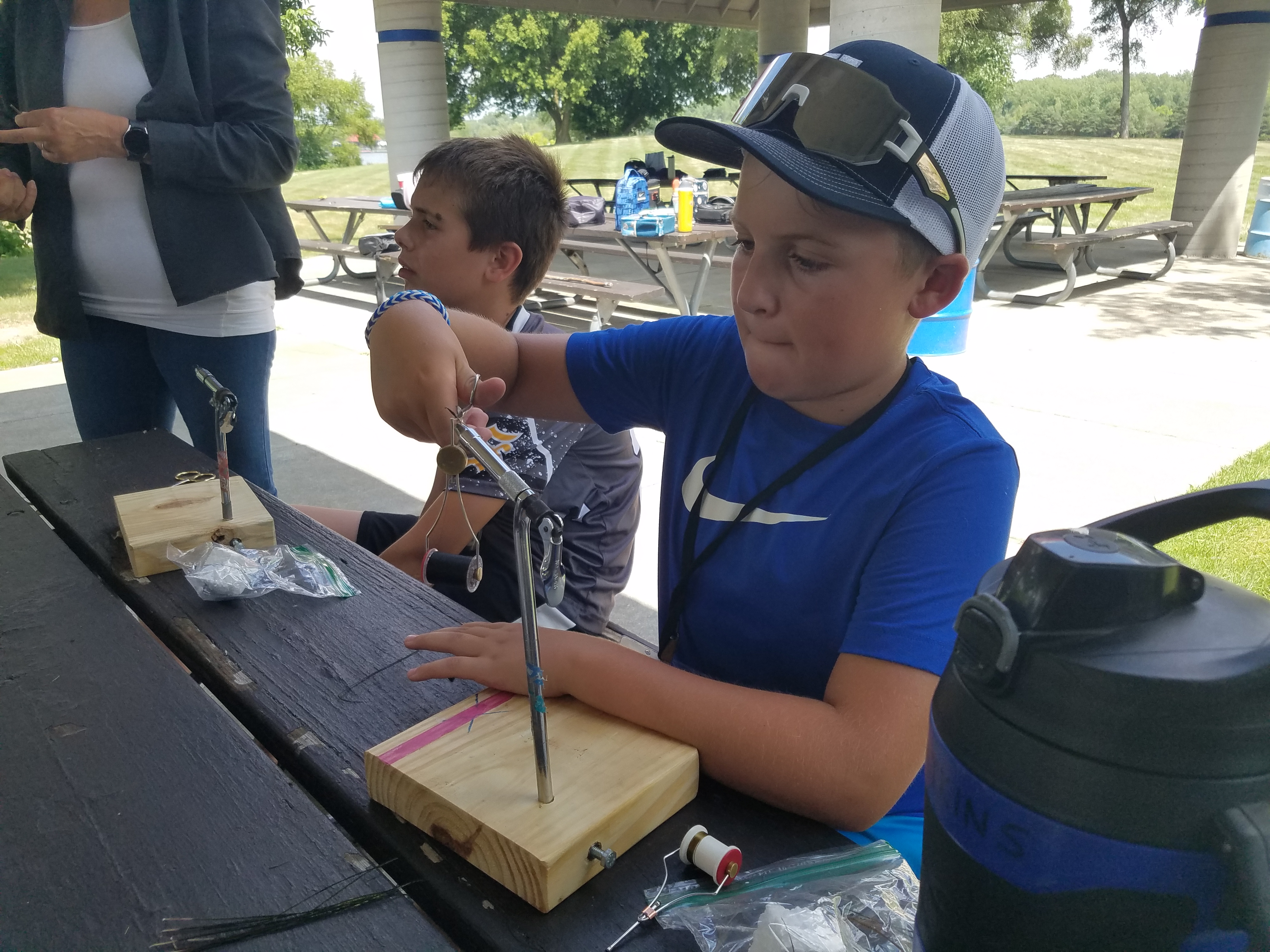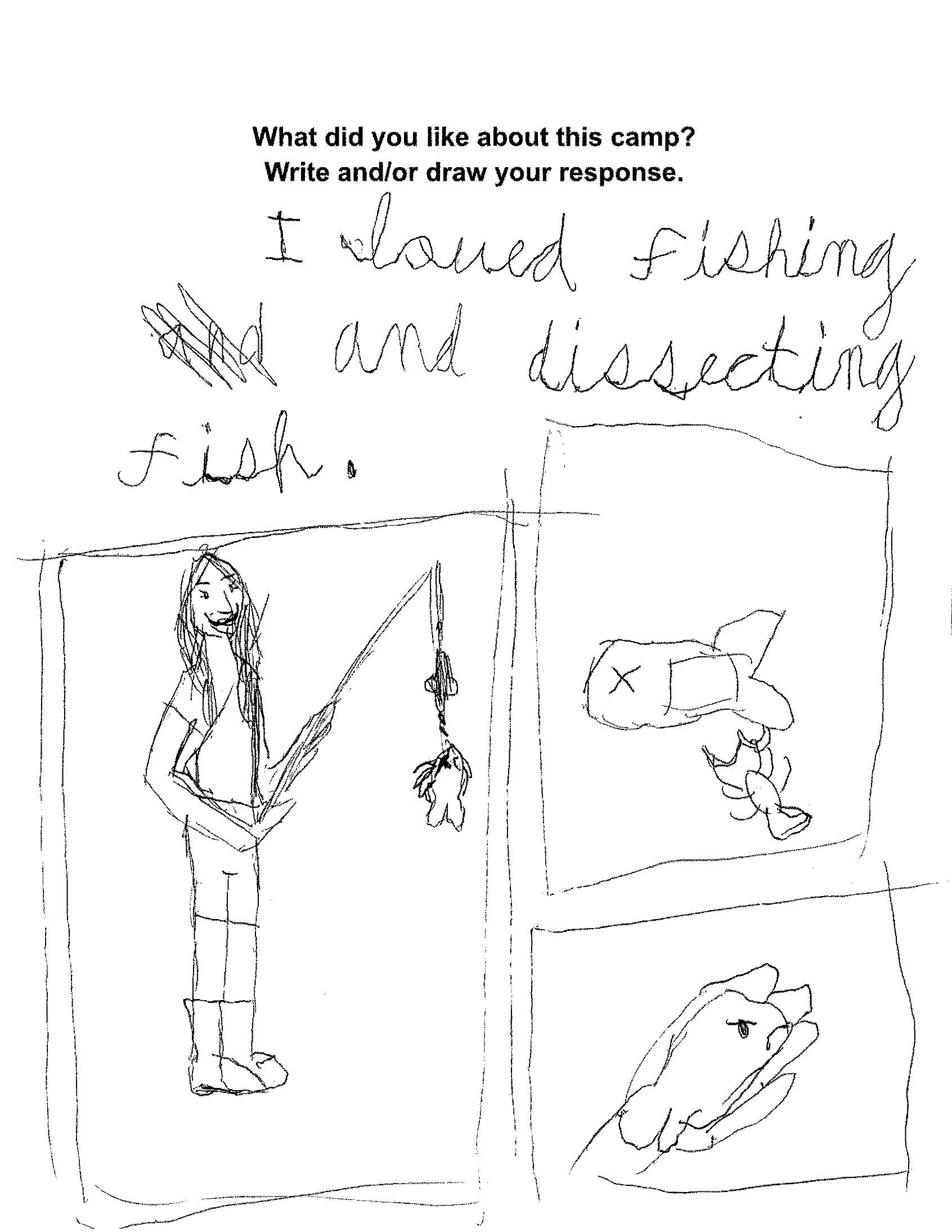Getting Hooked on Fishing in Saginaw Bay
Annual camps help create next generation of Great Lakes stewards, improve fishing knowledge and skills. They help youth connect to their local waterways and learn the importance of clean water and a healthy fishery.

At the 2025 Saginaw Bay 4-H Fish Camps, youth 8-12 years old learned all about fishing and how to protect our Great Lakes. Campers gained skills in angler ethics, knot-tying, tackle crafting, casting, stopping aquatic invasive species, and, of course – fishing!
Michigan Sea Grant, MSU Extension, Michigan 4-H, Project FISH, and many local partners host these camps to recruit the next generation of anglers and Great Lakes stewards. The camps also rely on sustained funding from Saginaw Bay WIN and The Conservation Fund, along with rod and reel donations from Wildlife Forever and Project FISH.
Since 1996, the program has trained more than 2,500 volunteers who have worked with more than 300,000 youth. Not only do these individuals learn about sportsfishing, but they also connect to their local waterways and learn the importance of clean water and a healthy fishery.
Real-World Impacts
More than 60 campers joined the Saginaw Bay 4-H Camp program in 2025. Eight teens served as counselors while building leadership and angling skills. The two-day camps occurred in three different locations in the Saginaw Bay Watershed with place-based sessions focused on local issues and opportunities. Camp locations included: River Side Park in Au Gres (Arenac and Iosco County); Bay City State Park in Bay City (Bay County); and Haithco Park in Saginaw (Saginaw County).
Each session broke the ice with a fish-matching game. Every camper received a picture of a freshwater fish’s head or tail, then went on a quest to find the other camper whose picture paired with theirs. This provided a swift introduction to common fish families as well as helping the campers get to know each other. They then explored knot-tying and applied their new skills by assembling their fishing rods. After learning how to cast, campers made new friends and had fun while fishing throughout the camp.
To better understand the impacts of Saginaw Bay 4-H Fish Camp, organizers conducted a pre- and post-survey with campers. Survey results clearly showed that campers improved their fishing knowledge and skills. For instance, 100% of campers left the event knowing how to tie fishing knots, and 60% of campers reported that they’d gained this skill at camp.

Youth also learned more about the Great Lakes and important topics like aquatic invasive species (AIS). According to NOAA, “an invasive species is an organism that causes ecological or economic harm in a new environment where it is not native.” Staff from the Saginaw Bay CISMA (Cooperative Invasive Species Management Area) led AIS-focused sessions that helped campers learn about local species of concern and potential career paths to explore.
According to the post-camp survey, every participant left camp knowing how to define and stop the spread of aquatic invasive species. 73% of campers reported gaining skills and knowledge in how to prevent AIS as a result of camp.
At the end of each camp session, participants brought home the rod and reel they’d assembled, a fully loaded tackle box, and lots of resources to further explore Michigan and Saginaw Bay’s wonderful fisheries.
Getting Involved
The camp program emerged in 2016 after an annual Project FISH workshop designed to help adult participants learn to teach kids to fish. Project FISH was launched in 1996 with support from MSU Extension, the Michigan Department of Natural Resources, Great Lakes Fishery Trust, and many volunteers.

This camp is open to members of 4-H, which has no enrollment fee. If you have previously enrolled in Michigan 4-H or are already connected with a club or county staff person, visit 4-H Online to complete or update your enrollment for the current year. If you are new to Michigan 4-H and want to learn more or sign up, register here.
Information for next year’s camps will be posted in 2026 - including opportunities for campers, counselors, volunteers, and funders.
Michigan Sea Grant is committed to research, education, and outreach through partnerships with people and organizations to foster healthy Great Lakes coastal ecosystems, communities, and economies. A collaborative effort of the University of Michigan and Michigan State University and its MSU Extension, Michigan Sea Grant is part of the NOAA-National Sea Grant network of 34 university-based programs.
This article was prepared by Michigan Sea Grant under award NA24OARX417C0157-T1-01 from the National Oceanic and Atmospheric Administration, U.S. Department of Commerce through the Regents of the University of Michigan. The statement, findings, conclusions, and recommendations are those of the author(s) and do not necessarily reflect the views of the National Oceanic and Atmospheric Administration, the Department of Commerce, or the Regents of the University of Michigan.



 Print
Print Email
Email

